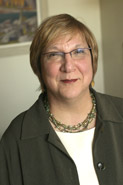Entre nous: Harassment and discrimination
Entre nous: Harassment and discrimination McGill University
User Tools (skip):
Entre nous with Associate Provost Martha Crago
Harassment and discrimination
It's definitely a work in progress and a project with a long history, but McGill's policy on discrimination and harassment is now in its final stages of development and will be completed in 2005. Guiding the process — and the progress — is Associate Provost, Academic Programs, Martha Crago (who is also the dean of graduate and postdoctoral studies). She spoke recently to the Reporter about the policy, its roots and the final steps remaining.

Associate Provost of Academic Programs Martha Crago
Owen Egan
What's the history behind the discrimination and harassment policy?
It actually goes back to the '80s when McGill's board of governors approved the Regulation Concerning Complaints of Sexual Harassment. That policy, which has undergone only minor modifications since then, is applicable to all members of the university community. Then, in the '90s, McGill's university equity policy was approved by senate. That policy deals with employment equity for academic and non-academic staff. And, just last year, the senate passed an interim policy on psychological harassment to fulfill a legal requirement for a specific case. So historically we have had many of the major elements of a comprehensive policy on harassment and discrimination, in at least an interim format, but there were some pieces missing — like a more formal and inclusive policy, an office, educational programs and greater visibility for the policy and the procedures. The need for an office and a formal policy was articulated by a working group on equity, chaired by Dean of Students Bruce Shore, which recommended both the establishment of an Equity Office and the development of a policy on harassment and discrimination. It was at that point that I was asked to chair a working group and we began work on a draft harassment and discrimination policy in the fall of 2003.
How did your workgroup approach this issue? What were your terms of reference?
The working group's objective was to design a policy for the whole of the McGill community because, theoretically, harassment can take place between a variety of different partners. A student can be harassed by a support staff worker. A student can harass an administrative assistant. An administrative assistant can harass a professor. A professor can harass a student. There are as many possible combinations as there are stakeholder groups. So we thought it would be very important for McGill to have a policy that would include everybody and that would set forward a clear statement by the university that harassment and discrimination have no place in the university environment. The working group also thought that it would make good sense to include the existing sexual harassment policy into the new policy so that it would include all forms of harassment: sexual and psychological, as well as discrimination prohibited by the law.
What are the key elements of the policy?
There are three key elements in the document. One element is the policy itself. This is a statement that lays out the basic premise that the activities of the university can only flourish in an environment that is free of harassment and discrimination. The next key element is a set of procedures that indicate the process by which complaints will be treated. We need an approach that allows for an informal level of investigation, addresses any need for immediate action and also respects existing collective agreements and formal grievance procedures. The third key element is an office for information and referrals related to harassment and discrimination prohibited by the law. Here in this office, a director will organize events and information campaigns through workshops, newsletters, posters, email and websites. It would also serve as a resource to help people navigate the existing policies and procedures. We do not need the final policy in place before launching the office, so we are presently looking for office space and drafting a job description for the director, and the senate nominating committee will be appointing a selection committee.
How's the process of drafting the policy going?
A draft policy was developed by late spring of 2004 and it was then distributed to and discussed with various stakeholder groups over the summer. The stakeholder groups are the Student's Society of McGill University (SSMU), the Post-Graduate Students' Society (PGSS), the Association of Graduate Students Employed at McGill (AGSEM), the McGill University Non-Academic Certi-fied Association (MUNACA), the McGill University Non-Academic Staff Association (MUNASA), the McGill Association of University Teachers (MAUT) and the Trades and Services Union. MUNACA, MUNASA and MAUT decided to do extensive consultation with each other. This important process extended the timelines for input from their groups by about two months. I received their joint input the first week of November. The next draft will come to the working group by the end of January and then go to the joint board and senate committee on equity and finally to the board and senate for approval. We expect a final policy to be in place by the end of this academic year. I think one could say it is high time.
